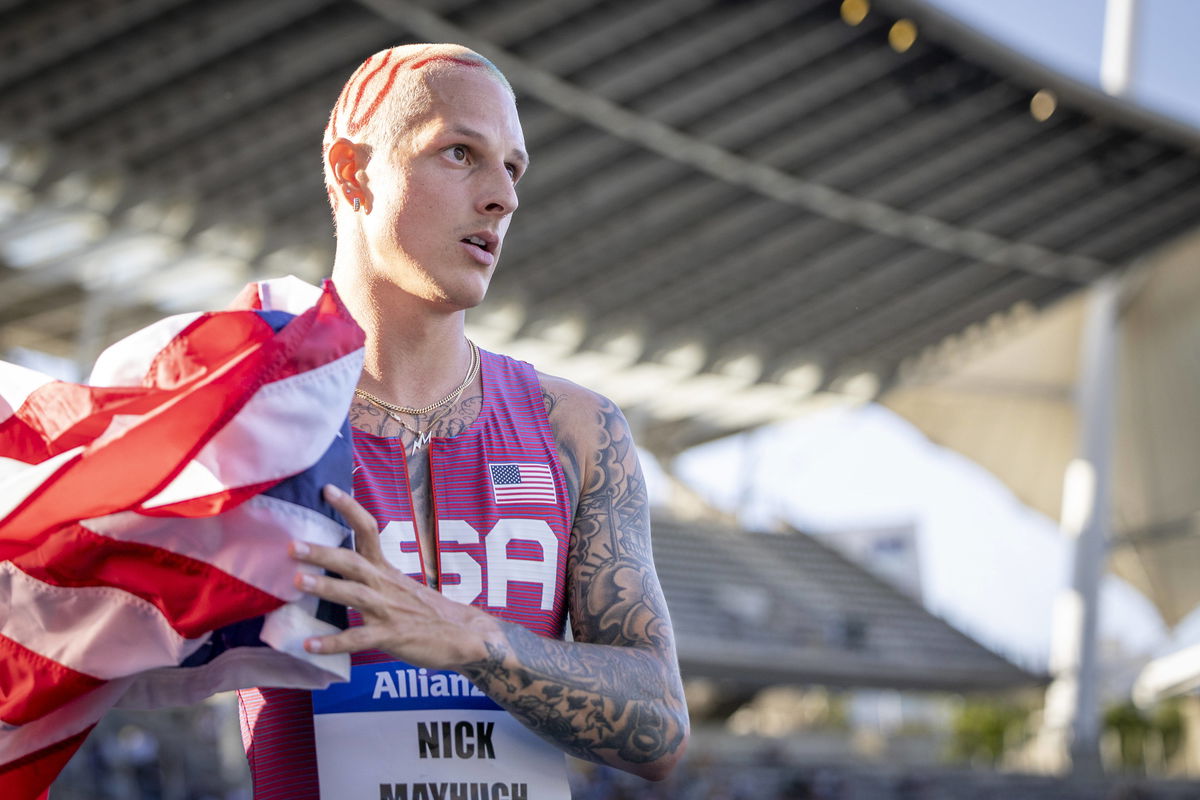
Imago
Paris 2023 World Para Athletics Championships Frankreich, 10.07.2023 Nick Mayhugh USA waehrend der World Para Athletics Championships am 10.07.2023 im Charlety Stadium in Paris, Frankreich. *** Paris 2023 World Para Athletics Championships France, 10 07 2023 Nick Mayhugh USA during the World Para Athletics Championships at Charlety Stadium in Paris, France on 10 07 2023. Copyright: xBEAUTIFULxSPORTS/LeahxKohringx

Imago
Paris 2023 World Para Athletics Championships Frankreich, 10.07.2023 Nick Mayhugh USA waehrend der World Para Athletics Championships am 10.07.2023 im Charlety Stadium in Paris, Frankreich. *** Paris 2023 World Para Athletics Championships France, 10 07 2023 Nick Mayhugh USA during the World Para Athletics Championships at Charlety Stadium in Paris, France on 10 07 2023. Copyright: xBEAUTIFULxSPORTS/LeahxKohringx
Before Paris, a part of Nick Mayhugh’s statement read, “Everyone always asks me, ‘Are you going to do the exact same thing that you did in Tokyo?’ And unfortunately, the answer is no, because I don’t have the opportunity to compete in four events.” In Tokyo, he became the first T37 athlete under 11 seconds in the 100m (10.95) and broke the 200m record (21.91). He won silver in the 400m (50.26) and helped set a world record in the mixed 4x100m relay (45.52). This was not going to happen in Paris because the Paralympian was moved to the T38 category.
Watch What’s Trending Now!
T38 classification limits athletes to three events: The 100m, 400m, and 1,500m, excluding the 200m and mixed relay. Mayhugh was disappointed back then by the move. As of today? Read what he thinks of classification in Paralympics in an Exclusive chat with EssentiallySports.
“Oh, well, I mean, that’s something that I don’t understand as well. And, you know, I’ll boldly say that the classifiers don’t understand even in their own right. It’s very frustrating because, for me personally, I feel like they’re trying to, they’re not trying to help the sport in the way that I think that they should.” This is what the 110m T37 athlete had to say when he was asked about classification in an exclusive interview with EssentiallySports. Despite being told that he was too fast for T37, he proudly told that he went in medically classified.
ADVERTISEMENT
They checked his medical records, tested his body, and even measured spasticity in his limbs, then had him run. He shared, “So to be sort of classified, I think should be, you know, based on your medical diagnosis and what you were born with or the traumatic experience you went through, whether, you know, you’re an amputee or such.” Why does he think that?
He himself explained how every disability comes with its own challenges and traumatic experiences. He believes classification should be based on medical diagnosis rather than physical performance, unlike how he was assessed. To explain further, he used himself as an example.
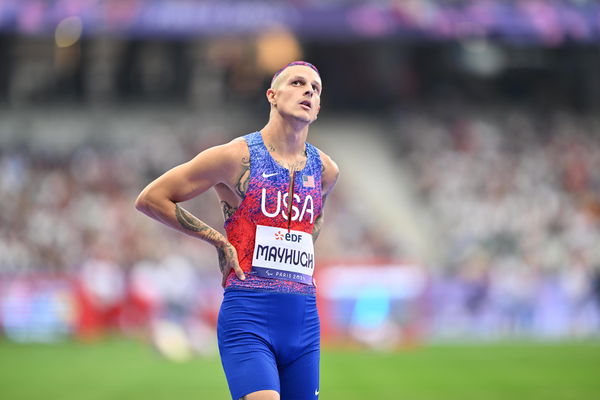
Imago
Paris 2024 Paralympic Games – Day 3 – Para Athletics PARIS, FRANCE – AUGUST 31: Nick Mayhugh of team United States gestures after competing in the Para Athletics Men s 100m – T38 on day three of the Paris 2024 Summer Paralympic Games at Stade de France on August 31, 2024 in Paris, France. France World. Editorial use only. Please get in touch for any other usage. PUBLICATIONxNOTxINxTURxUSAxCANxUKxJPNxITAxFRAxAUSxESPxBELxKORxRSAxHKGxNZL Copyright: x2025xAnadoluxMustafaxYalcÄnx
“Because I am an outlier, you know, I have been training my entire life to try to hide my disability from my parents, to my brother, to my cousins, my coaches, teammates, you know, going to play division one soccer, nobody knew until, you know, I sat everyone down in the locker room and said, ‘Hey, you know, there’s an article about to be, you know, published about me and you’re going to find out that I have a physical disability’,” the world record holder told.
ADVERTISEMENT
Born in Fairfax, Virginia, Mayhugh aspired to play professional soccer, inspired by his older brother Thomas. He rose through the youth soccer ranks before earning a spot on a Division I collegiate team. And even when he experienced a grand mal seizure and was later diagnosed with cerebral palsy, and the doctors told him that he wouldn’t play soccer again, he did not stop.
ADVERTISEMENT
Nick joined the U.S. Para 7-a-side National Soccer Team. There, he scored 34 goals across 25 international matches. He even won the 2019 U.S Soccer Player of the Year with a Disability Award. Then, in 2019, he transitioned to track. Evidently, he was an athletic person from the very beginning. He explained to EssetinallySports that he avoided telling people about his disability because he didn’t want to be treated differently.
Growing up hiding it, then being told he was “too fast for his disability,” felt frustrating. According to Mayhugh, such an approach is hurting the sport even more. He has a simple take. “We should be celebrating athletes for being able to outperform what doctors or classifiers think should be possible given their disability rather than, you know, hindered for in a way.” And the example he chose to explain it? Gold.
The World record holder brought other world record holders into the conversation – the GOATs themselves, Usain Bolt and Michael Phelps. “You know, you’re not going to tell Usain Bolt that he can’t run against humans because he’s the fastest human. He has to go run against horses now, would you? Or, you know, Michael Phelps has to go swim with a dolphin. You know, something silly like that to me,” he exclaimed.
ADVERTISEMENT
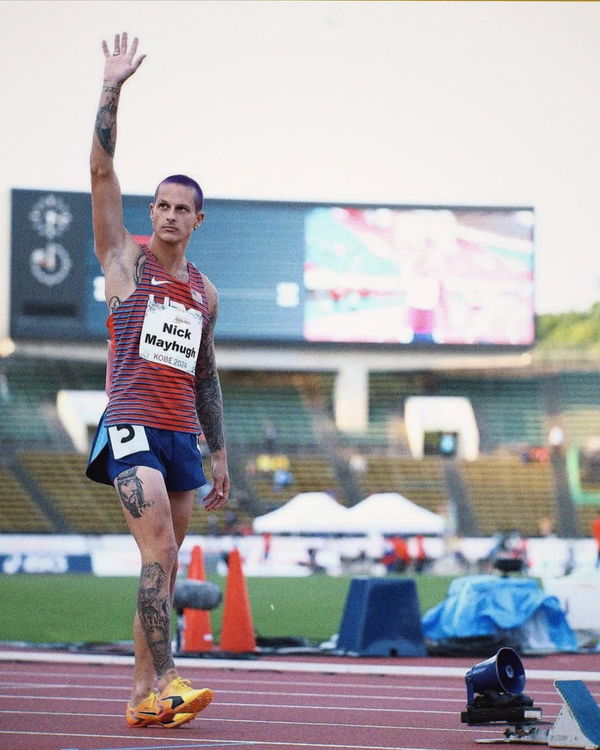
Imago
Nick Mayhugh via Instagram: nickmayhugh
Talking of how the classification process, according to him, is meant to match athletes with others of similar disability severity, he said, “I only compete against other athletes with the same or at least as they think the same severity of disability as I have. But they also told me I was too fast with my disability. So, you know, who knows? It’s a touchy subject that I plan to blow up the next five to ten years.” He is looking to bring many changes with his fight for the Paralympics.
And meanwhile, his ‘why’ of track and field has been changed as well.
ADVERTISEMENT
Nick Mayhugh’s why
At the Para National Championships, Nick Mayhugh took to the jump pit and won the men’s T38 competition with a best mark of 6.18 meters. He also claimed bronze in the 100m T38. His mark in the 100m was just five-hundredths of a second off his personal best and world record from Tokyo. These results earned him gold in the long jump and bronze in the 100m, securing his spot on the U.S. team for the Para World Championships in New Delhi. There, he aims to make his first international podium in the long jump. But his focus is on something more.
His focus never really left the track, but the reason behind it, the ‘why,’ has changed.
ADVERTISEMENT
In Tokyo, it was about proving what he could do. Now, it’s bigger than himself; it’s about carrying cerebral palsy onto the world stage, showing that disabled athletes are elite athletes too, and giving a voice to those who don’t have one.
Top Stories
Fired Sean McDermott Doesn’t Hold Back in Final Message to Bills Mafia As Locker Room ‘Sickened’ by HC’s Removal
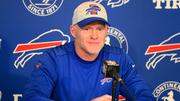
Tony Stewart’s Long-Awaited NASCAR Return Backfires as Daytona Entry Draws Harsh Reality Check

Andy Reid Confirms Double Hiring Decision After Chiefs Fire Offensive Coach
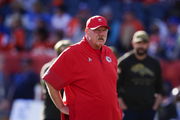
Mac Jones Issues Statement on Leaving 49ers Amid Backup QB’s Ongoing Trade Rumors

Charles Barkley Challenges ESPN To Fire Him After Harsh Criticism Of Co-Workers
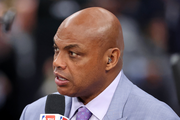
Ohio State QB Announces Retirement & Sends Farewell Message to Ryan Day

“I found so much greater joy in the messages I’ve received from other athletes’ parents — disabled and not — of them finding motivation in what I do or how I speak on my social media,” Mayhugh said. “Now, I feel like I have a responsibility to continue to compete to represent people that are like me that don’t have a voice.”
Mayhugh isn’t just chasing medals anymore; he’s chasing meaning.
ADVERTISEMENT
ADVERTISEMENT
ADVERTISEMENT
ADVERTISEMENT